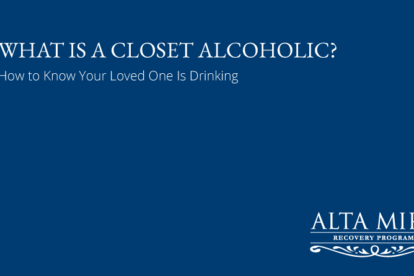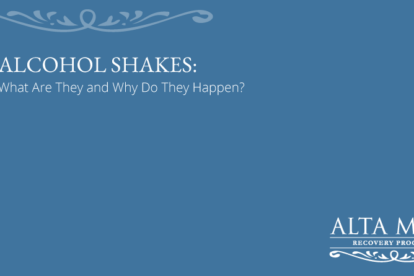
Top Bay Area Alcoholism Treatment Center | Luxury Alcohol Rehab Near San Francisco
Alcoholism – clinically known as alcohol use disorder (AUD) – is a chronic condition marked by an inability to control drinking, increased tolerance, and withdrawal symptoms when alcohol use stops. Over time, drinking despite negative consequences can impact nearly every area of life, from mental health and physical wellness to relationships and career stability.
Some people are more biologically or psychologically vulnerable to alcohol addiction than others, but effective treatment makes lasting change possible. At Alta Mira’s luxury alcohol rehab center near San Francisco, clients receive compassionate, evidence-based care designed to help them safely detox, rebuild their health, and develop the tools needed to maintain long-term sobriety.
Recognizing an alcohol problem often takes years. Many people reach a breaking point when the consequences become undeniable – strained relationships, declining health, financial hardship, or professional setbacks. When alcohol begins to control your choices rather than support your life, it’s time to seek help. Our residential alcohol treatment program in the Bay Area provides a safe, supportive environment to stop the cycle of drinking and begin genuine healing.
For many people, recognizing they are struggling with alcohol addiction can take years. Once an individual can no longer deny their addiction and the negative effects it has on their mind, body, career, finances, and important relationships, it can be difficult to fully accept that they are at a turning point in the road. When they get to this point in their addiction, it is important to seek residential treatment for their alcoholism before it spirals any further out of control.
World-Class Alcohol Rehab Program at Alta Mira
At Alta Mira Recovery Programs, our Bay Area alcohol rehab center offers world-class, evidence-based care in a serene, private residential setting overlooking the San Francisco Bay. Our mission is to help clients achieve lasting sobriety through comprehensive treatment that supports every aspect of their health – physical, emotional, and spiritual.
Our residential alcohol treatment program near San Francisco begins with a medically supervised detox, followed by an integrated therapeutic plan designed around each client’s unique needs. This includes individual therapy, group therapy, and family involvement, as well as advanced neuropsychological testing and assessments to better understand the factors driving addiction.
At Alta Mira, clients learn essential life and recovery skills, including relapse prevention, stress management, and healthy coping strategies that support long-term sobriety after treatment.
Highlights of our Alcoholism Treatment Program include:
-
State-of-the-art medical detox and continuous clinical support
-
Privacy and confidentiality in luxury residences with private or shared rooms
-
Individualized treatment plans with evidence-based therapies
-
Comprehensive neuropsychological testing and assessments
-
Holistic and experiential therapies such as yoga, mindfulness, and expressive arts
-
Family engagement and long-term aftercare planning
Choosing to begin treatment is a courageous step toward transformation. Our caring team provides the structure, expertise, and compassion needed to help you or your loved one reclaim a healthy and meaningful life.
What Is Alcoholism?
Alcoholism, also known as alcohol use disorder (AUD), is a chronic and progressive condition that affects how the brain and body respond to alcohol. People living with alcoholism struggle to control how much or how often they drink, even when alcohol use causes serious problems at work, in relationships, or to their health.
Over time, regular drinking changes brain chemistry, making alcohol feel necessary for daily functioning. This cycle leads to tolerance, cravings, and withdrawal symptoms when drinking stops – all signs of physical and psychological dependence.
While anyone can develop alcohol addiction, certain risk factors increase vulnerability, including:
-
A family history of alcoholism or substance use
-
Beginning drinking at an early age
-
Long-term or binge drinking patterns
-
Untreated mental health conditions such as anxiety or depression
-
Peer environments that encourage heavy drinking
-
Past trauma or chronic stress
Alcoholism does not develop overnight – it typically builds slowly as the brain and body adapt to repeated alcohol use. Without professional treatment, this cycle can lead to severe emotional, physical, and social consequences.
At Alta Mira’s residential alcohol treatment center near San Francisco, clients receive compassionate, research-based care to help them understand the roots of addiction and begin genuine healing.
Alcoholism and Co-Occurring Disorders
Alcoholism often occurs alongside other mental health conditions – a combination known as co-occurring disorders or dual diagnosis. For many people, alcohol becomes a way to cope with untreated emotional pain, anxiety, trauma, or depression. While it may seem to provide short-term relief, long-term alcohol use disrupts brain chemistry and often makes these symptoms worse.
The most common mental health conditions that co-occur with alcohol use disorder include:
-
Depression – Alcohol acts as a depressant and can intensify sadness, hopelessness, and fatigue.
-
Anxiety disorders – While alcohol may temporarily calm nerves, it heightens anxiety when its effects wear off.
-
Post-traumatic stress disorder (PTSD) – People may drink to numb trauma-related emotions, but alcohol interferes with healthy processing and recovery.
-
Bipolar disorder or mood instability – Alcohol misuse can trigger more frequent or severe mood episodes.
In addition to mental health concerns, alcohol addiction often leads to physical health complications such as liver disease, pancreatitis, cardiovascular issues, and nutritional deficiencies. Chronic alcohol use can also increase the risk of certain cancers, including those of the mouth, throat, and liver.
At Alta Mira Recovery Programs, our Bay Area alcohol rehab center provides integrated care for clients with both substance use and mental health conditions. Each client receives a personalized treatment plan that may include psychiatric evaluation, medication management, individual therapy, and holistic modalities that restore balance across mind and body.
Our multidisciplinary team understands how deeply interconnected mental health and addiction can be – and how treating both simultaneously is essential for long-term recovery.
Effective Treatment for Alcohol Use Disorder
There is no single cure for alcoholism, but with the right treatment and long-term support, people can successfully manage alcohol use disorder and rebuild healthy, fulfilling lives. At Alta Mira Recovery Programs, our Bay Area residential alcohol rehab combines medical expertise, psychological care, and holistic healing to address every layer of addiction.
Effective treatment begins with medical detox, where clients safely withdraw from alcohol under 24-hour supervision. Our medical team monitors vital signs, manages withdrawal symptoms, and ensures comfort and stability during this critical first phase.
Once detox is complete, clients move into a personalized treatment plan that integrates:
-
Individual therapy to uncover the emotional and psychological roots of addiction
-
Group therapy to build accountability and support
-
Family therapy to repair trust and strengthen communication
-
Evidence-based modalities such as Cognitive Behavioral Therapy (CBT) and Dialectical Behavior Therapy (DBT)
-
Holistic therapies including yoga, mindfulness, and nutrition education
-
Comprehensive neuropsychological assessments to identify co-occurring conditions or cognitive challenges
Treatment at Alta Mira goes beyond managing symptoms – it focuses on restoring balance, developing lifelong coping strategies, and building the confidence to navigate real-world challenges.
Our clinicians understand that recovery is a continuous process. Through ongoing therapy, community support, and aftercare planning, clients leave our San Francisco Bay Area alcohol treatment center prepared to maintain sobriety and thrive long after residential care ends.
Knowing When It’s Time For an Alcohol Rehab Center
Realizing you need help for alcohol addiction can be one of the most difficult but life-changing decisions you ever make. Many people spend years trying to cut back or stop on their own, only to find that drinking has become something they can no longer control. When alcohol begins to affect your health, relationships, finances, or sense of self-worth, it’s time to consider professional help.
Common signs that it may be time to enter an alcohol rehab center include:
-
Drinking more often or in larger amounts than intended
-
Needing alcohol to relax, socialize, or cope with stress
-
Experiencing blackouts, memory lapses, or mood swings
-
Feeling anxious, shaky, or irritable when not drinking
-
Hiding or minimizing drinking habits from loved ones
-
Struggling at work, school, or home due to alcohol use
-
Noticing health problems linked to drinking, such as high blood pressure or liver issues
If these signs feel familiar, residential care provides the structure and medical support needed to stop drinking safely and begin healing. At Alta Mira’s alcohol treatment center near San Francisco, clients start with a 30-day detox, stabilization, and assessment program that helps them physically and mentally prepare for deeper therapeutic work.
Our compassionate team guides every step of the process – from withdrawal management and emotional stabilization to personalized therapy and relapse prevention planning. By entering treatment, you take back control from alcohol and begin building the foundation for a healthier, more stable future.
How to Help a Loved One Get Treatment for Alcoholism
Watching someone you love struggle with alcoholism can be heartbreaking and exhausting. You may feel helpless, frustrated, or unsure of what to say – but your support can make a profound difference. At Alta Mira Recovery Programs, we’ve seen how caring family involvement often becomes the turning point that inspires someone to seek help.
First, it’s important to remember that addiction is not a lack of willpower. Alcoholism is a chronic brain disorder that changes how a person thinks, feels, and makes decisions. Understanding this can help shift the conversation from blame to compassion.
Here are a few ways you can support your loved one:
-
Speak with empathy and patience instead of judgment or anger
-
Learn about alcohol use disorder and how it affects behavior
-
Avoid enabling behaviors, such as covering up the consequences of drinking
-
Encourage professional evaluation or detox rather than trying to manage withdrawal at home
-
Share information about reputable alcohol treatment centers in the Bay Area, including Alta Mira
-
Offer emotional support while reinforcing healthy boundaries
If your loved one is resistant to treatment, you may consider working with a professional interventionist. Our admissions team can help connect your family with the right intervention specialist to guide that process.
When your loved one chooses treatment at Alta Mira, they’ll enter a supportive, private environment where experienced clinicians help them detox safely, understand the root causes of addiction, and begin to rebuild their life. Families are also invited to take part in multi-day family programs that strengthen relationships and provide tools for long-term recovery.
No matter how long your loved one has been struggling, healing is possible. With the right help and encouragement, recovery can begin today.
How Our Alcohol Treatment Center Transforms Lives
At Alta Mira Recovery Programs, every client receives an individualized treatment plan that addresses the full picture of alcohol addiction – including any co-occurring mental health conditions, trauma, or underlying emotional challenges. Our Bay Area residential alcohol treatment center provides a structured, compassionate environment designed for deep healing and long-term success.
Comprehensive and Personalized Care
No two experiences with alcoholism are the same, which is why our clinical team designs personalized care plans based on each client’s history, needs, and goals. Treatment may include:
-
Comprehensive neuropsychological testing and assessment to guide individualized care
-
One-on-one therapy sessions with licensed clinicians
-
Group therapy and process groups to build community and accountability
-
Psychiatric care and medication management when appropriate
-
Family involvement through structured multi-day family programs
-
Holistic therapies, including yoga, expressive arts, mindfulness, and meditation
Evidence-Based and Experiential Therapies
We combine proven clinical methods such as Cognitive Behavioral Therapy (CBT), Dialectical Behavior Therapy (DBT), and trauma-informed care with holistic modalities that nurture the body and mind. This dual focus helps clients strengthen emotional resilience, develop new coping skills, and rebuild a sense of self-worth.
A Serene Environment for Lasting Change
Our alcohol rehab center near San Francisco offers the privacy and tranquility needed to focus fully on recovery. With luxurious accommodations, gourmet meals, and stunning Bay views, Alta Mira provides the serenity and comfort that help clients reconnect with themselves and their purpose.
Recovery at Alta Mira isn’t just about abstaining from alcohol – it’s about creating a meaningful life built on clarity, stability, and confidence. Our goal is to empower each person to leave treatment prepared for lasting sobriety and renewed wellbeing.
Integrated Treatment for Alcoholism & Co‑Occurring Disorders
Reclaim Your Life at Alta Mira
At Alta Mira Recovery Programs, we believe that lasting sobriety begins in a safe, supportive, and restorative environment. Our Bay Area alcohol treatment center near San Francisco combines the most advanced clinical care with the peace and privacy of a luxury residential setting.
Here, clients are guided by a multidisciplinary team of licensed professionals who understand the complex nature of alcohol addiction and co-occurring disorders. Through personalized therapy, medical support, and holistic healing, each person learns to rebuild a balanced, fulfilling life free from alcohol.
We know that reaching out for help is not easy – but it is the most important step toward change. Whether you are seeking help for yourself or a loved one, our admissions specialists can walk you through the process and answer any questions about detox, residential treatment, or aftercare planning.
Call us today to learn more about our luxury alcohol rehab center in Northern California and begin your journey toward lasting healing and renewal.
Don’t let alcoholism control your life. To begin your life-changing transformation, contact us today.
Alcoholism Treatment FAQs
The signs of alcoholism are numerous and common among most people who struggle with drinking, although there may be some individual differences. Experiencing just two of these can indicate a mild alcohol use disorder. The more symptoms present and the more severe they are, the more likely someone is to have a severe disorder. The stages of alcoholism can quickly lead someone from a mild problem to a real addictive disorder. Symptoms of alcoholism include:
- Trying to drink less but failing
- Being unable to control the amount of alcohol consumed
- Consistently drinking more than planned
- Spending a lot of time, energy, and money on getting more alcohol
- Experiencing cravings when not drinking
- Developing a tolerance, a need to drink more to get drunk
- Drinking in spite of problems that it causes, like fights with family or legal problems
- Experiencing withdrawal symptoms
- Drinking in situations when it is clearly not safe to do so, such as before driving
- Drinking even though it makes physical or mental health conditions worse
- Limiting engagement in activities, hobbies, and social engagements to drink
- Missing work or school or not completing responsibilities because of drinking or hangovers
Signs that someone is intoxicated include physical impairment, inappropriate behaviors, loss of inhibitions, unstable mood, slurred speech, impaired memory, difficulty paying attention, and impaired judgment.
Alcohol poisoning, or an overdose, may occur when blood alcohol levels rise to dangerous levels. Signs of alcohol poisoning include:
- Extreme confusion
- Vomiting
- Slowed or irregular breathing
- Low body temperature
- A blue tint to the skin
- Seizures
- Loss of consciousness and unresponsiveness
Alcohol poisoning is very serious and should be treated as a medical emergency. It can quickly lead to death if not treated as soon as possible. If in doubt that someone is suffering from alcohol poisoning, always call 911 or get the person to the emergency room immediately.
One of the most characteristic signs of alcoholism is withdrawal. Anyone who experiences withdrawal when not drinking and drinks to avoid those unpleasant side effects is physically dependent on alcohol. Withdrawal from alcohol can be severe and dangerous. The possible symptoms include:
- Anxiety
- Tremors and shaking
- Nausea and vomiting
- Excessive sweating
- Insomnia
- Headaches
- Stomach cramps
- Diarrhea
- High blood pressure
- Elevated heart rate
A severe reaction to withdrawing from alcohol is called delirium tremens. It causes confusion, severe vomiting, agitation, hallucinations, a fever, and convulsions or seizures. It should be treated as a medical emergency, and although not common delirium tremens is possible for anyone who has a severe alcohol use disorder.
Because withdrawal from alcohol can be so uncomfortable and even dangerous, it is best to detox with medical supervision. Treatment is best done in a residential alcohol addiction center beginning with supervised and sometimes medicated detox.
Most experts now agree that alcoholism is a disease, a chronic illness, and that it should be treated as such. It is not moral weakness on the part of the alcoholic, as some people still believe. This means that anyone can be treated. A commitment to residential alcohol treatment in a facility equipped to help someone with alcoholism can lead to overcoming alcoholism and lifetime management of the disease.






